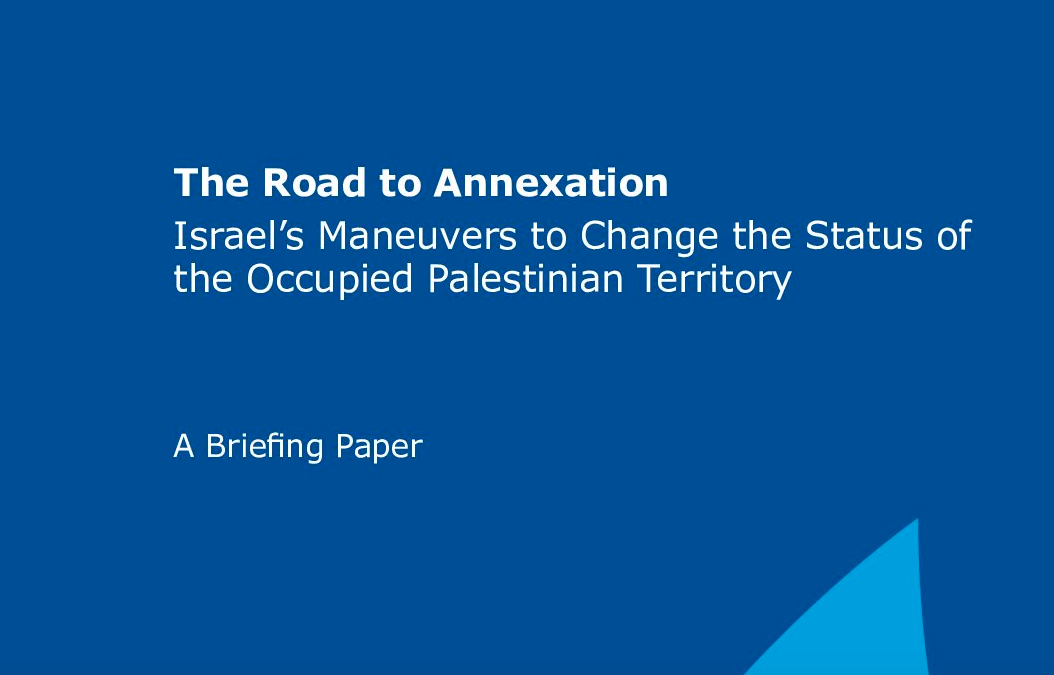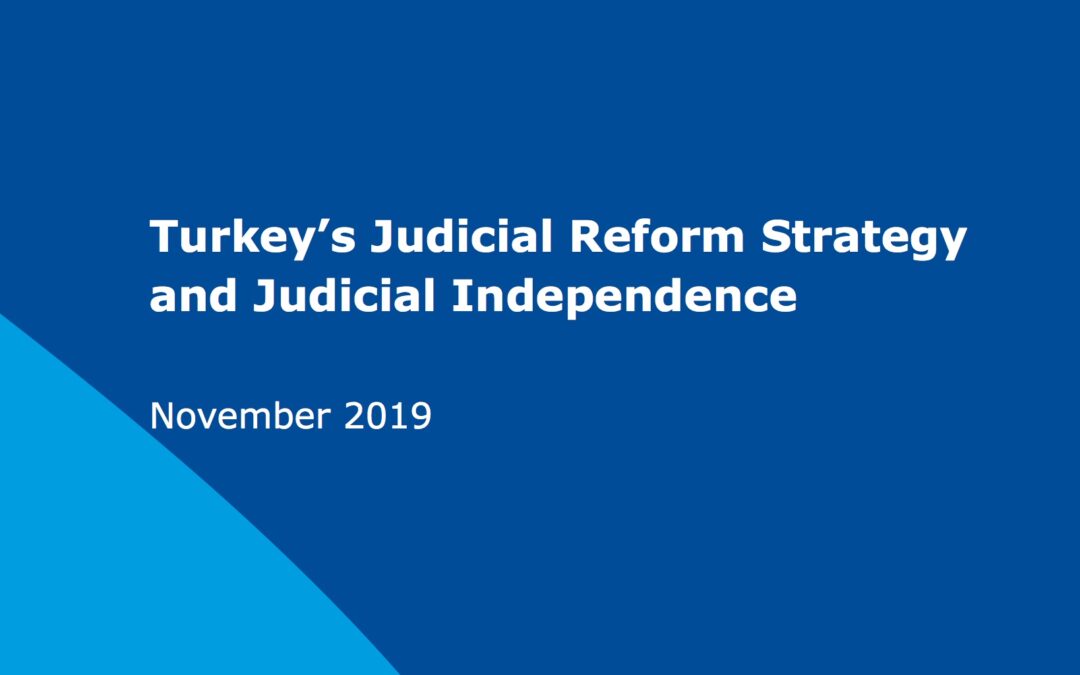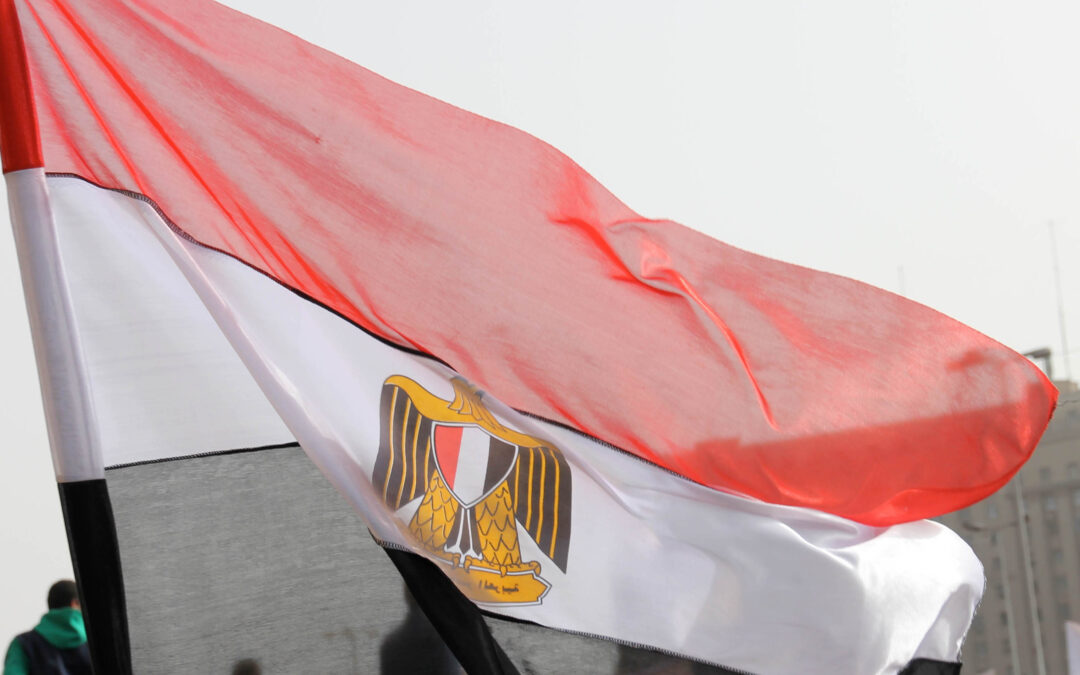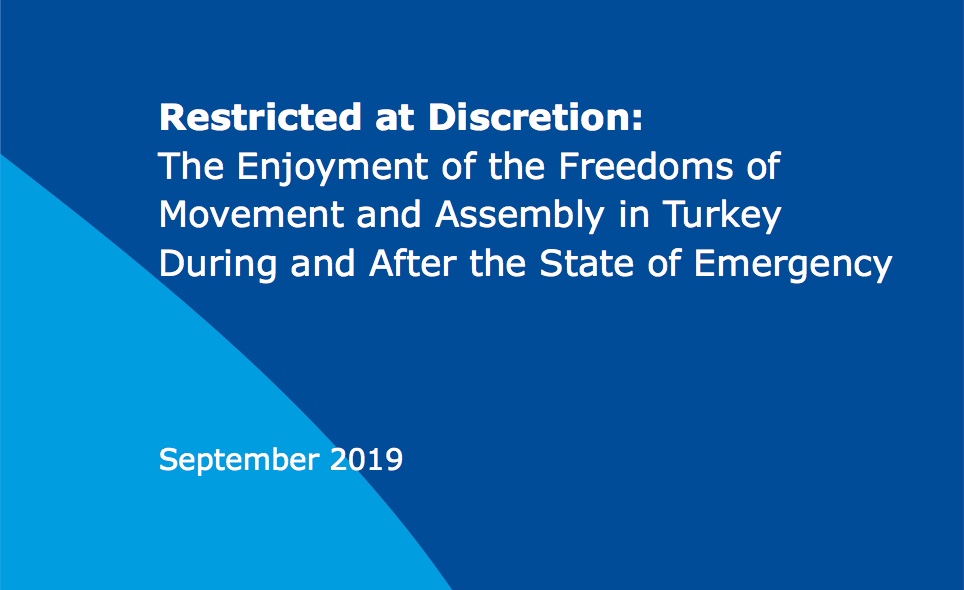
Nov 20, 2019
Israel must comply with its obligations under international law and reverse its policies and practices aiming at formally annexing parts of the West Bank, the ICJ said in a Briefing Paper released today, analyzing the applicable international law.
The ICJ’s analysis – The Road to Annexation – contradicts the 18 November 2019 statement by the US Secretary of State, Michael R. Pompeo, in which he asserted that the establishment of Israeli civilian settlements in the West Bank is “not per se inconsistent with international law.”
“Israel’s settlements are illegal no matter how hard the Israeli and the US governments try to spin or whitewash them,” said Said Benarbia, the ICJ Middle East and North Africa Director.
“Any sovereignty claims by Israel over East Jerusalem and the West Bank are null and void under international law and must be repudiated, not condoned or encouraged,” he added.
The ICJ’s Briefing Paper explains that such statements by the US administration are void and of no effect under international law, as are the underpinning Israeli settlement laws, policies and practices.
Throughout the 52 years of occupation over the West Bank, including East Jerusalem, Israel has implemented long-term, irreversible changes to the occupied territory, including the establishment and continuous expansion of Israeli settlements, as well as the construction of the Separation Barrier incorporating considerable parts of the West Bank into Israeli territory.
The ICJ Briefing Paper finds that these activities, combined with Israel’s legislative activity aiming at extending its sovereignty over settlements, are a further, strong evidence of Israel’s plans to annex parts of the West Bank.
Such annexation is prohibited by international law, including Article 2(4) of the UN Charter, which forbids the use of force against the territorial integrity of a State and, consequently, the transmission of sovereign title over territories resulting from such use of force.
The International Court of Justice has affirmed that the prohibition of territorial acquisition by force is a peremptory norm of international law, from which no derogation is permitted.
The ICJ also examines the legal implications of the annexation of the West Bank for third States, urging them not to recognize annexation efforts and activities, refrain from providing assistance to them, and act, collectively and individually, to bring such unlawful conduct to an end.
“The international community must not legitimize or aid and abet Israel’s moves to annex parts of the West Bank,” said Said Benarbia.
“Instead of condoning and supporting the acquisition of land by force, the US should urge Israel to end its occupation of the Palestinian territory, including by dismantling existing settlements and refraining from establishing new ones,” he added.
Contact:
Said Benarbia, Director of ICJ’s Middle East and North Africa Program, t: +41 22 979 38 17 ; e: said.benarbia(a)icj.org
Download:
Israel-Road to Annexation-Advocacy-Analysis brief-2019-ENG

Nov 18, 2019
Today, the ICJ and the Human Rights Joint Platform (IHOP) published the briefing paper assessing the reforms proposed in the Judicial Reform Strategy to promote judicial independence.
The briefing paper concludes that any judicial reform will be meaningless if implemented in the context of a judiciary which has been taken control of by the executive.
The lack of institutional independence of the judiciary, and the chilling effect of the mass dismissals of judges in the last years are serious threats to the rule of law. These factors clearly undermine the capacity of the judiciary as a whole to provide an effective remedy for human rights violations, both in regard to measures taken under the state of emergency, and in general.
The new Judicial Reform Strategy should be read against this background. Considering that problems relating to the independence of judiciary in Turkey are structural and that the situation has even further deteriorated due to recent amendments, the ICJ considers that the new Strategy will not be able to achieve its stated objectives unless it is amended or supplemented to address these structural problems.
In their briefing paper, the ICJ and IHOP note the commitment of the Turkish authorities to reform the systems of discipline, transfer, accession, promotion and ethics of judges and prosecutors in line with international standards.
However, these measures are deemed insufficient to restore judicial independence in Turkey without essential further reforms:
- reform of the Council of Judges and Prosecutors,
- reform of the Criminal Peace Judgeships system and
- repeal of Law no. 7145 that still allows for arbitrary dismissals of judges and prosecutors, among other civil servants
- introduction of judicial review for all decisions of the CJP
- introduction of a transparent and fair process of selection and appointment of judges and prosecutors ensuring the independence of the committee and process from the executive.
The briefing paper is a comment on the chapter of the Judicial Reform Strategy on judicial independence and it does not provide a full assessment of the situation of Turkish judiciary for which reference should be had to the ICJ reports Justice Suspended and Justice in Peril.
Download
Turkey-Justice Reform Strat-Advocacy-Analysis brief-2019-ENG (PDF, English)
Turkey-Justice Reform Strat-Advocacy-Analysis brief-2019-TUR (PDF, Turkish)

Jul 9, 2019
The ICJ today published a legal briefing (3 pages in Burmese and 2 pages in English) on Myanmar’s Child Rights Bill, which is under consideration by the Union Parliament.
The stated objectives of the Child Rights Bill are welcomed, particularly the commitment to implement Myanmar’s obligations under the Convention on the Rights of the Child (CRC).
However, based on drafts of the Bill that the ICJ has reviewed, the organization is concerned that if passed into law as presently formulated, the Union Parliament would miss a significant opportunity to protect the rights of those children throughout Myanmar who face discrimination based on race or ethnicity, and who experience human rights violations as a result.
Because the Bill does not sufficiently protect the right of a child to acquire citizenship of Myanmar, the Bill fails to meet its stated objectives, and also fails to comply with and implement the State’s international human rights law obligations under the CRC.
The ICJ provides a recommendation for legislators to amend the Bill before it is passed into law, in order to sufficiently protect the rights of a child to acquire citizenship/nationality, and to implement the State’s obligations under the CRC.
Contact:
Sean Bain, Legal Adviser for the ICJ, sean.bain@icj.org
Myanmar-Child Bill-Advocacy-Analysis brief-2019-ENG (full analysis, English, in PDF)
Myanmar-ChildBill-Advocacy-Analysis brief-2019-BUR (full analysis, Burmese, in PDF

Apr 20, 2019
The Egyptian government should withdraw proposed constitutional amendments that will consolidate authoritarian rule, Human Rights Watch and the ICJ said today.
The amendments will undermine the Egyptian judiciary’s dwindling independence and expand the military’s power to intervene in political life.
On April 16, 2019, Parliament finalized and approved the amendments, which a pro-government bloc proposed in early February. On April 17, the National Election Authority said a public referendum was set for April 19-22. The official draft amendments were only published in the official Gazette on April 18.
The vote takes place amid ongoing mass arrests and a relentless crackdown on fundamental freedoms, including currently targeting those calling for boycotting or rejecting the amendments. Given the ongoing repression, and that political opposition in Egypt has dwindled to a nominal presence, a free and fair vote will be impossible.
“These amendments aim to smother Egyptians’ aspirations to live in dignity and under the rule of law,” said Michael Page, deputy Middle East and North Africa director at Human Rights Watch. “The authorities should immediately halt efforts to pass these amendments by threatening, disappearing, and persecuting peaceful critics and dissidents.”
The 596-seat Parliament, which is dominated by members loyal to President Abdel Fattah al-Sisi and which routinely rubber-stamps government decisions, passed the amendments by a vote of 531 to 22. During Parliament’s “societal dialogue” sessions, few critics were allowed be take part in the discussions about the amendments.
“The amendments are a flagrant assault on the rule of law and independence of the judiciary in Egypt. If adopted, they will effectively place the military above the law and the Constitution and cement the executive’s subordination of judicial and prosecutorial authorities,” said Said Benarbia, ICJ’s MENA Director.
The initial amendments would have allowed al-Sisi to run for two more six-year terms, after his current second term. The final amendments will permit him to run for one additional term and also extends his current term from four to six years, a move that attracted criticism inside Egypt.
The amendments are particularly troubling given the widespread suppression of fundamental freedoms, including freedoms of expression, association, and assembly and the right to political participation, all of which are essential to a free and fair public vote.
A coalition of 10 secular and leftist political parties called for rejecting the amendments. Local news reports say that the public prosecutor is investigating an opposition political figure, Hamdeen Sabbahy, for “instigating chaos” and insulting the state because of his opposition to the amendments.
The authorities have also started aggressive smear campaigns against several activists and award-winning actors, and are exploring the potential prosecution of them following their participation in public advocacy efforts about Egypt’s human rights situation in Washington, DC and European capital cities in March.
In February and March alone, authorities arrested or prosecuted over 160 dissidents or perceived dissidents, according to Egyptian rights lawyers who spoke with Human Rights Watch.
Authorities also briefly arrested another opposition figure, Mamdouh Hamza, a businessman, on February 16, accusing him of “publishing false news” and citing critical posts on his Twitter account. They released him on bail a few hours later. Al-Araby al-Jadeed newspaper said that other opposition figures have received telephoned “threats.”
On April 10, the authorities blocked an independent campaign website, “Batel,” which, in the context of the referendum, could be translated as “void.” Egyptians living abroad started the campaign, inviting Egyptians to register their “No” votes online. Access to the site was blocked in Egypt only hours after its launch, but the campaign still managed to amass tens of thousands of “No” voters in a few days.
The authorities blocked seven other alternative websites that the campaign made to circumvent the efforts to block access in Egypt.
In their efforts to block access to the campaign, the authorities have blocked about 34,000 websites, according to an internet-monitoring website.
Since mid-2017, the authorities have blocked access to hundreds of websites including most of the independent news websites and some for human rights organizations.
The independent news website Mada Masr reported on February 10 that security authorities instructed mainstream media in Egypt not to report on the amendments, and in particular not to give critics any coverage. Mada Masr also reported that, at least since December 2018, meetings between staff from al-Sisi’s office and intelligence officials have been held at the General Intelligence Agency “on a nearly daily basis,” coordinated by al-Sisi’s son Mahmoud, a senior intelligence officer, to push the amendments.
A few days after parliamentarians proposed the amendments, supportive placards, signs, and billboards were erected across the country.
On April 16, Mada Masr, quoting witnesses in East Cairo, reported that security authorities had pressed business owners to post the signs. The government denied imposing fines on those who refused, but the authorities refused to permit opposition protests on March 27, citing “security threats.”
The al-Mashhad website also published a leaked memo from judges of the State Council, the body that contains the Supreme Administrative Court, to the Parliament, which said that the amendments “demolish judicial independence.” The State Council’s deputy chief justice, Judge Samir Yousef, later confirmed that he drafted the memo.
In July 2013, then-defense minister al-Sisi led the forcible removal of Egypt’s first freely elected president, Mohamed Morsy. Al-Sisi was officially elected president in 2014 and re-elected in 2018, after his government arrested or intimidated all of the other potential candidates.
Al-Sisi has presided over a government that has committed widespread and systematic human rights violations, including mass killings of protesters, arbitrary arrests, enforced disappearances, extrajudicial killings of detainees, and torture and other ill-treatment in detention. Some of these crimes most likely constitute crimes against humanity.
The nationwide crackdown first targeted al-Sisi’s Islamist opponents but quickly expanded to include political dissidents, human rights lawyers and defenders, journalists, artists, gay men, lesbians, transsexuals, and virtually anyone expressing the mildest critical views. Government security forces, including the army, violate human rights with almost total impunity.
Since April 2017, the government has imposed a state of emergency, which has been used to justify undermining judicial independence, and used abusive counterterrorism and media laws to suppress fundamental freedoms.
President al-Sisi has apparently long opposed many of the human rights guarantees in the current constitution, saying in September 2015 that “the Constitution was written with good intentions. But countries cannot be built with good intentions.” The parliament speaker, Ali Abd al-Aal, said that a new constitution should be drafted in 5 or 10 years. Critics say this will happen when al-Sisi nears the end of his third and final term.
In an April 17 news conference, Judge Lasheen Ibrahim, the head of the National Elections Authority, called on Egyptians to vote and said that amending the constitution was justified because “it has to fit the [society’s] situation.”
“Egypt’s autocracy is shifting into overdrive to re-establish the ‘President-for-Life’ model, beloved by dictators in the region and despised by their citizens,” Page said. “But it’s a model that recent experience in Egypt and neighboring countries has demonstrated is not built to last.”
Egypt-Constitutional amendments-news-press release-2019-ENG (PDF, press release, Arabic)
For more information, please contact:
In Berlin, for Human Rights Watch, Amr Magdi (English, Arabic): +1-646-659-8020 (mobile); or magdia@hrw.org. Twitter: @ganobi
In New York, for Human Rights Watch, Michael Page (English): +1-617-453-8063 (mobile); or pagem@hrw.org. Twitter: @MichaelARPage
In Geneva, for the International Commission of Jurists, Said Benarbia: 0041798783546; or said.benarbia@icj.org
For more information about the abusive amendments, please read:
Egypt Constitutional Amendments: Unaccountable Military, Unchecked President and a Subordinated Judiciary
Egypt-Constitutional amendments-advocacy-analysis brief-2019-ENG (PDF, English)
Egypt-Constitutional amendments-advocacy-analysis brief-2019-ARA (PDF, Arabic)









